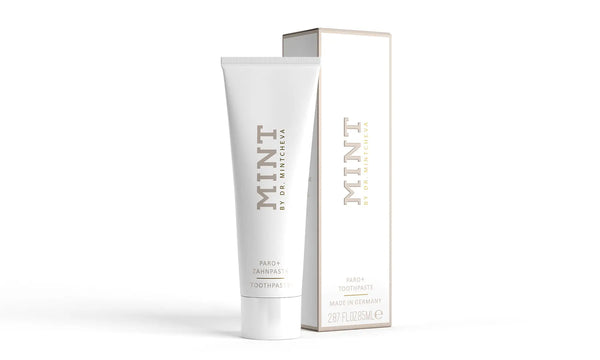Today we're addressing a common but often overlooked concern: irritated gums. Our gums play a crucial role in our overall oral health and should therefore receive special care. Its irritation can be due to various factors, and we would like to highlight them here. In addition to the possible causes of irritated gums, we also reveal effective strategies for treatment and prevention. Here you go, so you can give your gums the attention they deserve.
Irritated gums: causes
Irritated gums can have a variety of causes, which are mainly related to everyday habits but can also be related to various medical conditions. First, the cause must be found; only then can targeted measures for relief and prevention be effective. These factors can cause irritated gums:
Inadequate oral hygiene
Neglecting daily oral hygiene, such as irregular tooth brushing and a lack of care between the teeth, leads to plaque buildup that irritates the gums. The wrong brushing technique can also irritate the gums unnecessarily. It is important to always stroke down from the gum line and not scrub back and forth. This may be a little more time-consuming, but it is definitely worth it. The following principle applies: if there are no bacteria, the gums are not inflamed.
Bristles are too hard
Using toothbrushes with bristles that are too hard can traumatize sensitive gums and cause irritation. Please use a soft to medium-hard version at most. It is also important to change your toothbrush every three months.
Inflammation of the gums (gingivitis)
Gingivitis, a common form of gum inflammation, is caused by bacteria in plaque and results in redness, swelling, and bleeding. If left untreated, gingivitis leads to periodontitis, which in turn leads to early tooth loss. The topic must therefore be taken seriously.
Hormonal changes
Hormonal fluctuations during pregnancy, menstruation, or menopause often make the gums more sensitive and cause irritation. Especially during menopause, the gums can become drier, which is perceived as a dry mouth.
Smoking and tobacco use
Smoking and tobacco use have been shown to have negative effects on oral health and irritate gums.
Stress
Chronic stress can weaken the immune system and increase inflammatory responses in the body, which also affect the gums.
Poorly fitting dentures
If the denture does not fit properly or is damaged, the gums suffer; the gums often react inflammatoryly, especially if there are pressure points.
Bad dentures: crowns, bridges, and veneers
Poorly fitting crowns, veneers, and bridges with edges that are too thick or leaky cause an increased accumulation of bacteria in this area. The bacteria irritate the gums, and this in turn manifests itself in the form of bleeding gums or bad breath.
Lack of hydration
Dehydration affects oral health and leads to dry mouth, which in turn irritates the gums.

An overview of effective methods for irritated gums
-
Gently brush your teeth
-
Use dental floss correctly
-
Alcohol-free mouthwashes
-
Chamomile tea rinses are a proven home remedy
-
Application of aloe vera gel and hyaluronic gum serum
-
Avoiding irritants such as tobacco
-
Adequate fluid intake
-
Probiotic foods
-
Consultation with a dentist
Irritated gums treatment
Soothing irritated gums is essential to maintaining optimal oral health. Proven techniques and home remedies play a crucial role in relieving the irritation and promoting the well-being of the gums.
A crucial first step is to switch to gentle dental hygiene. Using a soft-bristled toothbrush and brushing gently will help avoid further irritating the gums. At the same time, regular and gentle flossing should be integrated into your routine to remove plaque between your teeth and prevent gum inflammation.
Sensitive, alcohol-free mouthwashes also clean hard-to-reach areas and often work wonders. These mouthwashes have anti-inflammatory properties and can be used several times a day after brushing your teeth or in between meals. Chamomile tea also proves to be an effective home remedy because it has calming properties and can relax the gums as a mouthwash.
For direct application to irritated gums, a gum gel or serum with vitamins and hyaluronic acid is an excellent option. Due to its anti-inflammatory active component, it provides relief, provides plenty of moisture, and promotes healing. Avoiding irritants such as tobacco, alcoholic beverages, and spicy foods also helps reduce gum irritation.
Adequate fluid intake, especially in the form of water, plays an important role in keeping the mouth moist and minimizing the formation of bacteria. Incorporating probiotic foods like yogurt into your diet helps promote healthy bacterial flora in your mouth. In addition to a balanced diet, oral probiotics can support the health of the oral flora. High-quality probiotic dental care gently regulates the oral bacterial balance and thus minimizes gum irritation caused by bad bacteria.
Hyaluronic acid, applied to the gums, helps moisten the gums again and eliminate dry mouth.
Despite the effectiveness of these methods, it is crucial to see a dentist if symptoms persist or you are unsure about the cause. Professional advice and an accurate diagnosis ensure targeted treatment and long-term oral health.
Soothe irritated gums: this is the optimal care
Soft toothbrush
Use a soft-bristled toothbrush to gently clean the gums without causing additional irritation.
Toothpaste for healthy gums
A toothpaste that is specifically formulated to meet the needs of your gums is certainly a good choice if you have sensitive gums that are prone to irritation. These toothpastes contain anti-inflammatory and soothing ingredients that really stimulate the healing of the gums and make them resilient.
Such a toothpaste is the MINT Paro+, it works with high cleaning performance and low abrasion, so that your teeth are sparkling clean while the gums receive an absolutely gentle treatment. The Paro+ toothpaste provides everything your gums need to be healthy and strong: anti-inflammatory ingredients and soothing components such as panthenol and chamomile extract nourish your gums and ensure lasting protection.
Discover the MINT Paro+ toothpaste now. This way!

Alcohol free mouthwash
A gentle and, above all, alcohol-free mouthwash supports dental health and helps to reduce gum inflammation and the risk of tooth decay because the mouthwash penetrates into hard-to-reach areas and frees them of harmful plaque bacteria.
All MINT mouthwashes are alcohol-free and do not contain any aggressive or irritating ingredients. We recommend the MINT mouthwash from the Paro+ line, especially for your gums. It provides the irritated gums with plenty of moisture with hyaluronic acid, supplies them with valuable vitamins B, E, and K, and protects them from new stress with antioxidant properties.
Discover the mouthwash from the MINT Paro+ line here

Don't forget to floss
In addition to good mouthwash, dental floss ensures thorough cleaning of the spaces between the teeth and prevents the accumulation of plaque.
Interdental brushes
Interdental brushes are useful for cleaning hard-to-reach areas and ensuring no food remains. It's also a good choice for those of you who don't like flossing.
Regulate bacterial balance
We generally recommend cleaning your tongue every day and removing bacteria. This is practically done with a tongue cleaner or a toothbrush. Another measure to ensure a balanced bacterial balance is the use of oral probiotics. They minimize the bad bacteria in the mouth and promote the good ones, so that no areas of inflammation can arise and your breath always stays fresh.
MINT provides such probiotic care with the Biotic line. All care components in this line work with the innovative active ingredient SymReboot, which ensures a balanced oral bacterial balance. In addition to effectively relieving irritated gums, Biotic products also sustainably neutralize annoying bad breath.
Discover the MINT Biotic line now

Nourishing and moisturizing gel
A soothing gum gel or serum sustainably nourishes the gums with everything they need to be healthy. These textures can be used selectively, in the areas that are affected, and have a moisturizing effect with fluoride, which gives the gums new resistance and makes them strong.
The MINT Hyaluronic Gum Serum is such a moisture booster and pampers the gums with new elasticity. The MINT gum gel with vitamin E and B12 also provides effective protection. It contains natural peppermint oil and extracts of cucumber and lemon. The gums become noticeably more vital, and your mouth feels cared for and always fresh.
Try our MINT hyaluronic gum serum & the refreshing MINT gum gel with vitamin E now
Irritated gums after dental crown
After a dental crown is inserted, there may be temporary sensitivity in the surrounding gums. A careful approach to oral hygiene is essential, and it is recommended to use a soft toothbrush to gently clean the gums around the crown. Mouthwashes also help to calm any irritation during this phase.
Pay particular attention to your food and drink choices during this time. Avoid foods that are too hot, too cold, or too spicy to avoid unnecessary strain on the gums around the crown. A gentle diet with soft and easily digestible foods in the first few days after crown placement will significantly minimize pressure on the gums.
It is normal to require a slight adjustment period while the gums adjust to the new crown. Regular dental check-ups are crucial to ensure the crown is fitted correctly and any potential problems are identified early.
We strongly advise avoiding tobacco consumption, as smoking impairs healing and further irritates the gums around the crown. If symptoms persist or worsen, please see your dentist immediately to identify the exact cause and take appropriate measures to optimally care for the dental crown.
Seek professional help
If persistent gum irritation is noted, especially after dental crowns have been placed, prompt consultation with a dentist is essential. Intense pain, swelling, bleeding, looseness of the dental crown, temperature sensitivity, persistent discomfort, or irregularities in bite function are alarming signs that require professional attention. Longer healing times or persistent discomfort should not be ignored. An early visit to the dentist allows for an accurate diagnosis and the implementation of appropriate measures to ensure the health of the dental crowns and surrounding gums.

Specific dental care products after placing a dental crown
After placing a dental crown, it is important to use the right dental care products to support crown care and minimize possible irritation. Here is an overview of some recommended dental care products:
- Soft toothbrush
- Toothpaste with antibacterial and soothing properties - MINT Paro+ toothpaste
- Alcohol-free mouthwash - MINT Paro+ mouthwash
- Special dental floss for crowns
- Interdental brushes
- Oral probiotics for a balanced bacterial balance - MINT Biotic line
- Nourishing and moisturizing gel or serum for selective use around the crown - MINT gum gel and MINT hyaluronic gum serum

Common misconceptions about irritated gums
There are numerous misunderstandings surrounding the topic of irritated gums, which can lead to uncertainty and misconceptions. Here are some common misconceptions we would like to clear up:
Irritated gums are always due to poor oral hygiene
Irritated gums can have a variety of causes, from hormonal changes to stress to genetic factors. It is not solely due to poor oral hygiene.
Only older people have to deal with irritated gums.
Irritated gums affect people of all ages. Hormonal changes, certain medications, or even poor dietary habits can also cause gum irritation in young people.
Irritated gums heal on their own
While, in some cases, mild irritation may improve on its own, it is not advisable to ignore it. Left untreated, irritated gums can lead to further problems, such as gingivitis or periodontitis.
High abrasion toothpaste is better for irritated gums
A toothpaste that is too abrasive can further irritate irritated gums. The use of gentle toothpastes with soothing ingredients is therefore absolutely recommended.
If you have irritated gums, you should avoid flossing
The opposite is the case. Regular, gentle flossing is important to remove plaque between teeth and prevent further gum irritation.
Mouthwashes are unnecessary if your gums are irritated
Mouthwashes with anti-inflammatory properties can definitely help soothe the gums and reduce germs. However, choosing an alcohol-free version is preferable.
Irritated gums only affect the oral cavity
Irritated gums can affect the entire body. There are links between gum inflammation and various systemic diseases, such as heart disease or diabetes.
Educating yourself about these misconceptions is crucial to creating a better understanding of the causes of irritated gums and taking appropriate preventive and care measures. If in doubt, it is always advisable to seek professional advice from a dentist.
Conclusion on the topic: irritated gums
Overall, looking at the topic of irritated gums illustrates the complexity of this problem and the need for comprehensive oral hygiene. The causes of gum irritation are varied, ranging from poor oral hygiene to hormonal changes to structural problems such as dental crowns. It is important to understand that irritated gums can not only cause local discomfort but can also be linked to systemic diseases.
Proper dental care plays a key role in preventing and treating gum irritation. Gentle cleaning with suitable dental care products is essential, especially after dental crowns have been placed. Natural active ingredients such as chamomile, peppermint oil, and vitamins help soothe the gums and support the healing process. Moisture boosters, such as a hyaluronic gum serum, provide the gums with plenty of moisture, accelerate the healing process, and strengthen their elasticity. This way, you can soothe irritated gums and effectively prevent gum inflammation.
Nevertheless, early consultation with a dentist is essential if symptoms appear or worsen. A professional look enables a precise diagnosis and the application of appropriate treatment methods. Collaboration between patient and dentist is crucial for long-term oral health and avoiding more serious complications. Therefore, if gum irritation persists, a dentist should be consulted to ensure individual solutions and targeted care.






